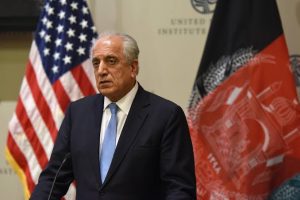
In this scandal-every-day world of Washington, it is hard to stay focused on any one revelation for longer than a 24-hour news cycle. Some stories, however, have reverberations that last long past their appearance on the front page of US newspapers and as the main topic of discussion on cable news networks.
The revelation that US President Donald Trump shared classified information about the Islamic State (ISIS) with two top Russian diplomats at a recent White House meeting is one such example.
On the surface, it may seem more of a tempest in a teapot than a full-blown scandal. As president, Trump can declassify any intelligence he wants at any time he wants to do so. And, while the United States and Russia are not friends, they are partners in the fight against ISIS. Others at the meeting, such as H.R. McMaster, the US national security adviser, downplayed the incident, saying Trump was only trying to encourage the Russians to make greater efforts against ISIS.
Upon closer inspection, several serious problems emerge.
First, while the president is free to declassify any top secret he wants, he is not as free to disclose it when it has come to the United States from an ally. Normally, the United States contacts the ally in advance to find out if it is OK to divulge the sensitive information to another country. Then the president works with his national security team to ensure that only the pertinent facts are exposed. In this case, none of these protocols were followed and Trump appears to have just made up his own mind to share the information.
The allies in question in this case appear to be Israel and probably Jordan. Israeli Prime Minister Binyamin Netanyahu, who has excused other anti-Jewish statements and actions by Trump, seems intent to ignore this one as well. A spokesman for his government directed all inquiries to the Israeli Embassy in Washington.
As for Jordan, Trump made what some said was an unscheduled call to King Abdullah II the day following the story in the Washington Post. Some media outlets speculated it was to deal with fallout from disclosing the information to the Russians.
The question then becomes how much does this affect the United States’ relationship with intelligence services in Middle East. One bit of very sensitive information the president reportedly shared was the city inside ISIS territory where the plot to use computer laptops to blow up aeroplanes was located. While the Russians are partners with the United States against ISIS, they have other interests in the region and other partners who are anti-US, such as Iran, that might find it interesting to know that such an intelligence asset exists in Syria.
Now that ISIS is likely aware that an Israeli or Jordanian spy is in their midst, it will do its best to root out such an individual. As we have learned, ISIS doesn’t particularly care if it kills numerous innocent people while it hunts for the mole.
In January, Obama administration officials warned Israel to be careful about what sensitive information it shared with the Trump administration because they were concerned it could be leaked to the Russians. Well, this sensitive information wasn’t leaked. It was given away in a very out-in-the-open manner.
After this incident, US intelligence experts are publicly saying that Middle East countries will be very reluctant to share important, sensitive information about ISIS with the United States, for fear Trump will repeat what he did with the Russians and endanger their intelligence assets in Syria.
Their fears are likely well-founded. If the United States and the world have learned anything from the first few months of Trump’s term in office, it is that he will do and say anything without any apparent logic, rhyme or reason.







